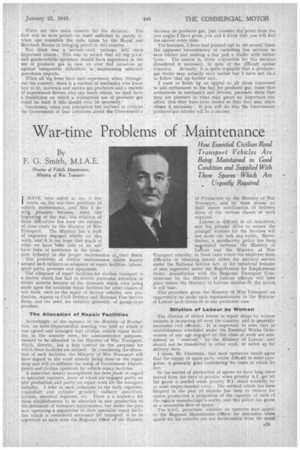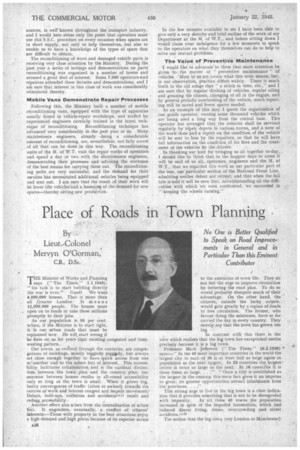War-time Problems of Maintenance
Page 35

Page 36

If you've noticed an error in this article please click here to report it so we can fix it.
By F. G. Smith, M.I.A.E.
Director of Vehicle Maintenance. Ministry of War Transport
How Essential Civilian Road Transport Vehicles Are Being Maintained in Good Condition and Supplied With Those Spares Which Are Urgently Required
HAVE been asked to say a few 1 words, on,the war-time problems of vehicle maintenance, and this I do Witpleasure because., since the. beginning of thewar, the solution of these difficulties has been the subject of close study by the Ministry of War Transport. The Ministry has 'a staff of engineers engaged wholly on this work, and it is our hope that much of what we have be>n able to do will have been of assistance to the trans-1 _
port industry in the proper maintenance of their fleetS. The problems of vehicle maintenance centre mainly ' around such subjects as adequacy of repair facilities, labour, spare parts, premises and equipment.
The adequacy of repair facilities for civilian transport is a matter which has had to receive particular .attention in -recent months because oi the demands which were being made upon the available repair facilities for other classes of war work, such as therepair of Service vehicles, new production, repairs th Civil Defence and National Fire Service fleets, and the need, for industry generally, of garage-type. premises.
• The Allocation of Repair Facilities
Accordingly, at the instance of the Ministry of Production, an inter-Departmental meeting was held at which it
. was agreed and arranged that civilian vehicle repair facilities in the country were;' for administrative purposes. deemed to be allocated to the Ministry of War Transport. Nthich, thereby, has a firm control on the purposes for • which these facilities are utilized. In considering the allocation of such facilities, the Ministry of War Transport will have regard to the work already being done-in the repair shop and will co-Ordinate the need's of Government Departinenta and civilian operators for vehicle repair facilities. . A somewhat similar arrangeinent has been.niade in regard to specialist repairers. many of whom are.engaged partly on new production and partly on repair work for the transport industry. I refer to such industries as the body repairers. crankshaft and cylinder grinders, radiator specialists, welders, electrical repairers, etc. There is a tendency for•these establishments to be absorbed in new production to the detrimeat of transport maintenance, but under the plan now operating a prpportion of their specialist repair facilities which is considered neressary.for transport is to be 'registered as such with-the Regional Office of the Ministry of Production by the Ministry of War Transport, and by these means we hall secure stabilization of delivery dates of the various classes of work required.
• Labour is difficult in all industries, and the present drive to secure the yOunger workers for the Services will not make our task any easier, -Nevertheless, a satisfactory policy has beep. negotiated between the Ministry of 'LaBour and the Ministry of War Transport whereby, in those cases where the employer finds difficulty in releasing labour either for military service under the National Service Act, Or for industrial transfer of men registered under the Regislration for Employmeat Order, Consultation with the Regional Transport Commissioner by the Ministry of Labour officials will take place before the Ministry of Labour decides aNi the action it will take.
This procedure gives the .Ministry of Was Transport an opportunity to make such representations to the Ministry of Labour as it thinks fit in any particular case,
Dilution of Labour,by Women
The dilution of skilled labour in repair shops by women trainees is increasing all over the country, and is generally successful end efficient. It is. important to note that in establishments scheduled under the Essential Works Order women of any age engaged on this class of work are considered as " reserved:" by the Ministry of Labour, and should not be transferred to other work, or called up for military duty. I think, Mr. Chairman, that most operators would agree that the supply of spare parts, whilst difficult in Some categories, is generally good considering the times in which vire
live. . •
In the matter of production of spares we have long since moved from the•days of priority when priority A.I. got all the goods it needed while priority B.I. stood wistfully by or went empty-handed away. The method which has been adopted in the past 12 months has been to reserve for spares production a proportion of the capacity' of each of the vehicle manufactu‘er's works, and this policy has given us a reasonable flow of spares,
The S.S.C. procedure, whereby an operator may appeal to the Regional .Maintenance Officer for assistance when snares for his vehicles are not forthcoming 'from the usual
sources, is weir known throughout the transport industry, and I would here stress only the point that operators must use this S.S.C. procedure on every occasion when spares are in short supply, not only to help themselves, -but also to enable us to have a knowledge of the types of spare that are difficult to obtain, The reconditioning of worn and damaged vehicle parts is receiving very close attention by the Ministry. During the past year a series of lectures and demonstrations on parts reconditioning was organized in a number of towns and aroused a great deal of interest. Some 7,000 operators end repairers attended these lectures and demonstrations, and I am sure that interest in this class'of work was considerably stimulated thereby. .
Mobile Vans Demonstrate Repair Processes
Following this, the Ministry built a number of mobile reconditioning vans, equipped with the type of apparatus usually found in vehicle-repair workshops, and staffed by experienced engineers carefully trained in the latest technique of reconditioning. Reconditioning technique has advanced very considerably in the past year or so. Many maintenance engineers, already doing a considerable amount of reconditioning, are, nevertheless, not fully aware. of all that can be done in this way. The reconditioning units of the M: of W.T. visit the repair works of operators
and spend a day or two the maintenance engineers, demonstrating their processes and .advising the workmen of the best Means for carrying them out. The reconditioning units are very successful, and the demand for their services has necessitated additional vehicles being equipped and sent out. I am sure that the result of their work will be fewer idle vehicles and a lessening of the demand for new spares—thereby saving new production. In the few minutes available to me I have been able to give only a very sketchy and brief outline of the work of my Department at the M. of W.T., and before sitting down I would claim your indulgence for a few moments to speak to the operators on what they themselves can do to help to solve our mutual problems.
The Value of Preventhie Maintenance
I would like to advocate-to them that more attention be given to the matter of " preventive maintenance" of vehicles. Most of us-are aware what-this term means, but, in our observation, practice differs widely. There is much truth in the old adage that " a stitch in time, etc.," and I am sure that by regular docking of vehicles, regular oiling , and greasing the chassis, changing of oil in the engine, and by genera] periodic overlooking of the vehicle, much repair
ing will be saved and fewer spares needed. , As an example of this may I quote the organization of one goods operator, owning some thousand vehicles which are being used a long way from the central base. This operator has arranged that the vehicles shall be serviced regularly by repair depots in various towns, and a note of the work done and a report on the condition of the vehicle will be sent to him by the repairers, so that he will have full information on the condition of his fleet and the treatment of the vehicles by the drivers.
In thanking our host for bringing us all together to:clay.., I should like to think that in the happier days to come it will be said of us all, operators, engineers and the M. of W.T., that we regarded this work as our particular part of the War, our particular section of the National Front Line,' admitting neither defeat nor retreat; and that when the full tale is told it will be seen that, notwithstanding all the difficulties with which we were confronted, we succeeded in " keeping the wheels turning."




























































